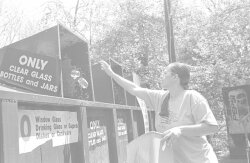Cost of recycling
Charlottesville has this in common with New York, Baltimore, and Charleston, West Virginia: All are considering dumping at least part, if not all, of their recycling programs.
Locally, the Rivanna Solid Waste Authority stirred up a green frenzy when it contemplated plans to stop accepting glass, plastic, phone books, and textiles at the McIntire Road Recycling Center— and to charge $1 per vehicle entering to recycle whatever’s left.
The cuts were geared to balance fiscal year 2003 budget, but that was before about 65 citizens crammed into a conference room at Authority headquarters (and many more were left standing in the hall to munch on a white and green iced sheet cake that said “Happy Earth Day”). At the beginning of the Authority's April 22 meeting, board chairman Rich Collins announced that the Authority was not going to adopt any of the proposals at that time because “we’re convinced it’s not in the public interest.”
“Reluctantly, we had to propose cuts in the budget and in hours of operation,” says Authority executive director Larry Tropea. “In the past, we were fully funded by disposal activities at the Ivy Landfill,” he adds. With that facility existing now as a transfer spot, unable to charge the heftier construction debris fees that used to fuel its economic engine, the Authority has been funded from Charlottesville and Albemarle County just to stay afloat.
Even though the city and county invested almost $1 million in the Authority, a $250,000 shortfall remained, according to Tropea. The proposed budget also raised fees at the Ivy landfill, discontinued one household hazardous waste day a year, and reduced hours at both McIntire Recycling and the landfill, which the budget proposed closing on Wednesdays– much to the chagrin of local trash haulers.
Tropea says trashing glass, plastic, textiles, and phone books recycling will save about $8,000.
“From what I understand, it’s pure economics,” says Preston Coiner, former chairman of the Authority's citizens’ advisory board. “Household recycling is not as attractive as it once was— if it ever was.”
From a financial standpoint, recycling aluminum is “an absolute financial winner,” says Tropea. Coiners’ Scrap Iron and Metal pays 30 cents a pound for aluminum cans (32 cans equal a pound). Cardboard and paper are also profitable.
Plastic and glass are the losers. “The markets for it may be less than the freight of getting it to them,” says Coiner.
The proposal to eliminate those materials from McIntire Recycling would leave would-be city greenies with nowhere to recycle plastic, which currently is not picked up curbside. Steve Lawson, in the city’s public service department, says the city could see a slight increase in trash tonnage, but that “plastic is all volume anyway.”
But plastic is particularly bad for landfills, says Andrea Trank, who founded Charlottesville Albemarle Recycle Together in 1990. No longer associated with CART, Trank doesn’t object to the proposed $1 charge per vehicle at McIntire Recycling. “I think pay as you go should work,” she says, “certainly for people committed to recycling.”
Over at Albemarle County, where independent haulers are required to pick up recycling, including plastic, public works chief Paul Muhlberger says the Authority's reductions in service will have no impact on county residents— with one exception.
“If a county resident suspects haulers are taking recycling and throwing it away, which I’ve seen them do, and [county residents] had been dropping off material at McIntire because of that, those county residents would be affected,” he says.
And for a county with a cultured and intelligent citizenry, Muhlberger adds, “Our recycling sucks.”
With the costs involved in recycling plastic and glass, is it worth it to try to recycle them? “Economically, no, it is not,” says Coiner. “But I think you have to look at the bigger picture. Environmentally, is it right not to recycle?”
Paul Hermsmeier at the Environmental Education Center says RSWA’s proposed reductions in service “are not a reflection of their commitment to recycling.” He sees it as beyond a budgetary decision. “The entire community should look at its recycling commitment.” And from the turnout at RSWA’s budget meeting, it appears that’s what’s happening.
